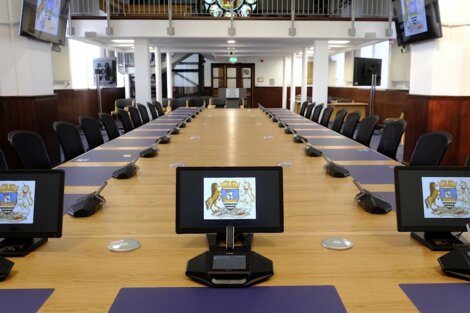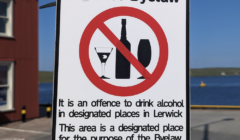Council / Free public transport and school meal motions fail to secure enough support
Many felt the motions were best directed at the Scottish Government – and finances posed a concern too
TWO council motions which supported no-cost bus and inter-island ferry travel in Shetland and free school meals for all pupils have fallen at the first hurdle.
Councillors ultimately decided that the motion to explore the costs and feasibility of free public transport – proposed by Shetland South members Alex Armitage and Robbie McGregor – was more of a matter for the Scottish Government.
It came down to a vote and the finely balanced result was 10-10.
Convener Andrea Manson had the casting vote, siding with an amendment from Gary Robinson against the motion.
Meanwhile a proposal to introduce free meals for all school pupils in Shetland as “soon as humanly possible” was brought forward by Shetland Central member Ian Scott and Lerwick North and Bressay’s Stephen Leask.
But that only received five votes in favour.
There was sympathy for both motions amongst councillors but many members felt they were better directed at the government.
And the additional cost to the council of both ideas also did not sit well with many – particularly after the Accounts Commission raised concern earlier this year over the SIC’s financial sustainability.
Both motions were heard at the end of a lengthy, and at times fiery, full council meeting on Wednesday afternoon.
The transport motion did not push for free fares straight away and instead sought for council officials to scope out the cost, feasibility and potential benefits.
Armitage and McGregor, who represent the Greens and the SNP respectively, felt free fares could help with the cost of living crisis – as well as the need to reduce carbon emissions.
The Green councillor claimed free bus fares could save a typical commuter around £1,000 a year, whilst being a “modest expenditure” for the SIC.
“There’s the climate benefit and obviously the cost of living benefit,” Armitage told councillors. “The other benefit is about boosting our economy in Shetland.”
Become a member of Shetland News
But Robinson made an amendment against the motion, saying while he had sympathy for the idea the matter was better directed to the Scottish Government.
“I think what we don’t need at the present time is to add more to our officers’ workload, at a time when we’re already asking them to find savings to balance our budget this year,” he added.
Meanwhile environment and transport committee chair Moraig Lyall said it was a “very good idea, at the very wrong time” due to budget pressures.
She also suggested the Scottish Government could use Shetland as pilot study in bus and car usage in a rural area.
SIC leader Emma Macdonald also said she was concerned the motion could potentially undo the lengthy work taken to secure revenue funding from the Scottish Government for operating the ferries.
Shetland South member Allison Duncan said the subject was a “national problem, and Mr Armitage and Mr McGregor should go back to their two parties and tell them to come with the money to Shetland”.
“If people can afford to pay, they should pay,” he added.
Shetland West member Mark Robinson said he was a part-time bus driver and noted that when removing people receiving free transport from the equation – like young people, medical exemptions and older folk – there are few passengers on services who are actually paying.
He added that people in Shetland tend to drive out of necessity and believed that the best way to get people to use buses is to provide a service that is more convenient.
McGregor admitted he was “distressed” that colleagues were going to “knock something back that would make a difference to the poorer members of society”.
But with Manson casting the deciding vote she said the council should be focusing on raising the matter with the Scottish Government.
When it came to extending free school meals to all pupils in Shetland similar themes emerged – that it should be raised with the government instead, and that it comes at a time when the SIC is trying to rein in its spending.
The additional cost of offering free meals to all was previously estimated at more than £600,000 – which would be taken from the council’s reserves in another unsustainable draw.
At the moment pupils in Scotland up to and including primary five receive free meals, while P6 and P7 are in line to be included once the delayed national roll-out gets back on track.
In secondaries families on low incomes can receive free school meals for their child.
But Scott and Leask felt Shetland Islands Council should go further and extend universal provision to secondary pupils too.
Scott said it was “for the good of the people of Shetland – it’s to help people in a time of dire need”.
It fell on Gary Robinson to again counter the motion, saying it was another matter for the Scottish Government.
He went as far as saying the motion was “politically and financially tone deaf”.
Robinson also clashed with Scott over the mechanics of the council’s reserves, which were valued at around £380 million at the end of October – saying the SIC does not have a large pot of money to use.
“Contrary to Scottynomics we don’t have £400 million that we can just go out and spend tomorrow,” he said, adding that he was informed by officers that the unallocated reserves were £49 million, which could drop to zero “very quickly” if current spending continues.
But Scott added that the SIC spent “£100,000 on a holiday for the Queen’s funeral – and I daresay in next May we’ll spend another £100,000 for our darling son’s coronation.”
“So we do have the money,” he stressed.
Depute leader Robinson felt universal free school meals could also make it more difficult to identify people truly in need.
But motion seconder Leask felt some families were put off from applying for free school meals due to perceived stigma.
There were a range of other views; Dennis Leask felt support should be more targeted, paediatrician Armitage said some secondary pupils were eating unhealthily at lunchtimes at supermarkets (“I’ve heard of children going to Tesco and buying a packet of custard creams for their lunch”), and Labour’s Tom Morton said there is a “real problem with hungry children”.
In the end, however, the vote represented a clear victory against the proposal.
A report on various options for school meals had already been brought to the council’s education and families committee two weeks ago but councillors decided against looking further into universal free provision.
Instead the consensus favoured the idea of increasing clothing grants by 50 per cent while also aligning some payment criteria for free school meals to help low income families.
Become a member of Shetland News
Shetland News is asking its many readers to consider paying for membership to get additional features and services: -
- Remove non-local ads;
- Bookmark posts to read later;
- Exclusive curated weekly newsletter;
- Hide membership messages;
- Comments open for discussion.
If you appreciate what we do and feel strongly about impartial local journalism, then please become a member of Shetland News by either making a single payment, or setting up a monthly, quarterly or yearly subscription.


















































































